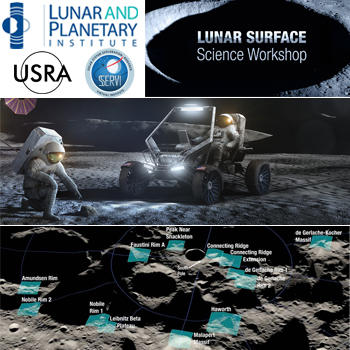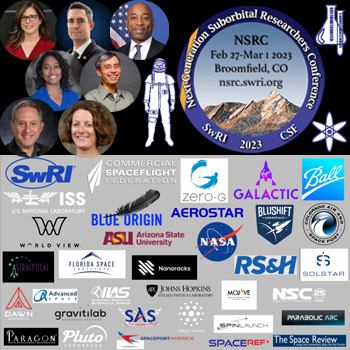Science Preparations Underway for Artemis 3 Human Landing Mission Launching NET 2025 |
MONDAY☆ Feb 27 — ISS, ~415-km LEO: Expedition 68 expected to be 11-member crew with arrival of Crew 6 (Bowen, Hoburg, Alneyadi, Fedyaev); transferring return cargo to Crew 5 craft which may depart early March with 4 members. ☆ Feb 27 — Tiangong Space Station, ~390-km LEO: Shenzhou 15 three-member crew continue science, station configuration and communications with Earth; Shenzhou 14 crew emerge from quarantine & recuperation for press conference. Highlights… o NewSpace: Terran Orbital subsidiary Tyvak to build 300 satellites, deploy 288 for Rivada Networks via US$2.4B contract; Launcher to continue development of Orbiter space tug, E-2 rocket engine under new owner Vast Space; Intuitive Machines (NASDAQ: LUNR) share price soars up to 800% over initial $10 share offering following SPAC merger. ☆ Solar System: Enceladus probe effort Moonraker, led by Aix-Marseille University, striving for $1.06B ESA award / NET 2038 launch; CNSA Zhurong Mars rover may have power issues following MRO confirmation vehicle is stationary since Sep 2022; Solsys Mining of Norway leading ESA Discovery project investigating lunar regolith treatment to produce fertilizer. ☆ Galaxy: University of Hawaii-led study finds observational evidence that black holes may be responsible for producing dark energy equal to the expansion constant of universe; NAOJ study suggests JWST high redshift galaxy detection which challenges conventional galaxy formation theory may be skewed by dust. o Global: 2 uncrewed ISRO Gaganyaan missions to occur in 2023, one with Vyommitra robot, Chandrayaan-3 on track for June 2023 launch following successful EMI / EMC testing; Infrastructure for Resilience, Interconnectivity and Security by Satellite (IRIS²) constellation to be deployed NET 2024 under $2.5B EU Parliament budget. ● USA: NASA Aerospace Safety Advisory Panel recommends Artemis management centralization, attention to launch cadence, fostering safety culture; NRAO, GBO, Raytheon collaboration ngRADAR may aid detection of NEOs such as 454-kg meteorite which exploded over Texas. ● Hawai’i: NASA Infrared Telescope Facility being utilized by Heidelberg University team to catalogue new water-containing asteroid class in Main Belt; UH Mānoa alumn Heidi Hammel is Achievement Rewards for College Scientists Foundation Hall of Fame 2023 inductee; Yale group monitoring SMBH escaping Dwarf Galaxy RCP 28 into interstellar space via Keck data. |
 |
● = Terrestrial and… o = International terrestrial events
☾ = Moon activity ★ = Space and… ☆ = International space / astro events in Hawaii Standard Time unless noted. Add 10 hours to obtain UT (‘Universal Time’). |
Weekly Planet Watch – Evening Planets: Venus (WSW), Mars (SW), Jupiter (WSW), Uranus (W).
2023 Next Gen Suborbital Researchers Conference Highlights Latest Flight Providers, Spaceports, Payload Opportunities
Broomfield, Colorado will once again host the Next Generation Suborbital Researchers Conference 2023 from February 27 to March 1, with main sponsors Southwest Research Institute and Commercial Spaceflight Federation Suborbital Applications Researchers Group. This will be the 8th meeting overall, held since 2010, and is supported by 32 other organizations. The program includes >20 keynote / confirmed talks, 2 opening and 12 regular sessions, 5 networking breaks, 4 panels, 2 poster sessions and a tour of Ball Aerospace (with up to 30 participants). There will be updates from (TL-BR) Karina Drees of CSF, Chris Baker of NASA, Kelvin Coleman of FAA, Sirisha Bandla of Virgin Galactic, Gary Lai of Blue Origin, and representatives from World View, CASIS, Zero Gravity Corp., Dawn Aerospace, Paragon Space Dev. Corp., Nanoracks, and Commercial Space Technologies. Alan Stern of SwRI and Addie Dove of CSF will chair the 2 opening sessions, and to follow are sessions titled Balloons, Commercial Partners, Technology Testing and Rockets, Bioastronautics and Human Factors, Flight Opportunities, Commercial Crew, and Markets & Policy. Sciences, education, public outreach, human-tended experiments, and training are also main topics. NASA solicitation for Suborbital/Hosted Orbital Flight and Payload Integration Services remains open until March 11 for providers of rocket-powered vehicles, high-altitude balloons, parabolic flights, orbital platforms, or entry, descent and landing testbeds. (Image Credits: SwRI, CSF, CASIS, Blue Origin, et al) |
● Feb 27 – Mar 1 — Southwest Research Institute, Commercial Spaceflight Federation Suborbital Applications Researchers Group, Broomfield CO: Next Generation Suborbital Researchers Conference; at Omni Interlocken Hotel and Resort. ● Feb 27 – Mar 3 — Gemini Observatory, NOIR Lab, TMT, Maunakea Observatories, National Center for Earth and Space Science Education, Department of Education Hilo-Waiakea, Hilo HI: Journey Through the Universe (Journey 2023); including in-person classroom presentations and career panels. ● Feb 27 – Mar 24 — UC Santa Barbara Kavli Institute for Theoretical Physics, Santa Barbara CA: Course: Building a Physical Understanding of Galaxy Evolution with Data-driven Astronomy. ☆ Feb 27 — Moon: 1.07° N of Mars, 19:00. ☆ Feb 27 — Apollo Asteroid 2023 CX2: Near-Earth Flyby (0.019 AU) ☆ Feb 27 — Aten Asteroid 2012 DK31: Near-Earth Flyby (0.032 AU) ☆ Feb 27 — Amor Asteroid 2023 CC2: Near-Earth Flyby (0.041 AU) Continued From… ● Oct 15 – Jun 15, 2023 — International Space Elevator Consortium, Online: Space Elevator Academic Challenge: Improving Humanity’s Future; for students 17-25. ☾ Dec 11 – Apr 25, 2023 — Hakuto-R / ispace Mission 1, Lunar Landing Trajectory: Carrying UAE Rashid 10-kg rover, 0.25-kg JAXA SORA-Q rover, Hakuto-R performing orbital control maneuvers to reach Lunar Orbital Insertion, followed by Moon touchdown nominally ~4.5 months after launch. ● Jan 18 – May 11 — Wichita State University, Wichita KS and Online: 2023 Interstellar Seminar ‘LASI 150G’; 1-credit hour seminar begins today; every Wednesday 14:30-15:20, led by Prof. Mark Schneegurt. ● Feb 1-28 — NASA, Online / Washington DC: Celebrate Black History Month with NASA. TUESDAY☆ Feb 28 — ISS, Crew 6 Rendezvous & Docking, ~415-km LEO: Crew Dragon spacecraft with Astronauts Stephen Bowen, Warren “Woody” Hoburg, UAE Astronaut Sultan Al Neyadi, Russia Cosmonaut Andrey Fedyaev to dock at ISS 2:38 EST, live coverage available. ● Feb 28 — ‘Imiloa Astronomy Center, NOIR Lab, Gemini Observatory, TMT, et al, Hilo HI: ‘Imiloa Astronomy Center’s Exhibit Hall: 19th Annual Astronomy Educators Reception: Journey Through the Universe Hawai’i Island; 17:00-20:00. |
● Feb 28 — Maryland Space Business Roundtable (MSBR), Greenbelt MD: MSBR Luncheon with Michael Morgan of NOAA.
● Feb 28 — Virgin Galactic, Online: Virgin Galactic to hold Q4 and Full Year 2022 financial results telecon; 14:00 PDT.
o Feb 28 — International Astronautical Federation, Online / Paris, France: Abstracts Due: 74th International Astronautical Congress (IAC 2023): Global Challenges and Opportunities: Give Space A Chance; being held October 2-6 in Baku, Azerbaijan.
● Feb 28 — STEAMSPACE, Huston-Tillotson University Dept. of Natural Sciences, National Space Society, Moody Foundation, Kepler Space Institute, Online / Austin TX: Registration Closes: 7th Annual Cities in Space: Student Competition and Conference 2023; main event occurring Mar 24.
☆ Feb 28 — Moon: 3.4° N of M35 cluster, 22:00.
☆ Feb 28 — Apollo Asteroid 2006 BE55: Near-Earth Flyby (0.023 AU)
WEDNESDAY
★ Mar 1 — New Horizons, Kuiper Belt: NASA spacecraft to awaken today from hibernation which began June 1, 2022; will work to observe distant KBOs, and Uranus & Neptune for sunlight reflection studies.
★ Mar 1 — SpaceX, Launch Falcon 9 / OneWeb 17, LC-40, Cape Canaveral SFS FL: Falcon 9 to launch 40 satellites for OneWeb constellation.
● Mar 1 — Lunar and Planetary Institute, NASA, USRA, Online / Houston TX: Abstracts Due: Lunar Surface Science Workshop: The First Steps in a Bold New Era of Human Discovery – Candidate Artemis III Landing Sites; to be held Apr 4-5.
● Mar 1-2 — University of Texas at Austin, Strauss Center for International Security and Law, Cockrell School of Engineering, International Academy of Astronautics, Austin TX: 9th Annual Space Traffic Management Conference: Achieving Space Environmentalism and Sustainability by Creating a Circular Space Economy.
☆ Mar 1 — Venus: 0.49° NNW of Jupiter, 20:00.
THURSDAY
o Mar 2 — Space Place Canada, Online / Toronto, Ontario, Canada: Webinar on Opportunities in Space: Lunar Gateway, Canadarm3 and New Space.
● Mar 2-5 — American Association for the Advancement of Science (AAAS), Hybrid / Washington DC and Online: AAAS Annual Meeting 2023.
☆ Mar 2 — Mercury: 5.2° S of Castor, 11:00; 1.75° S of Pollux, 17:00.
☆ Mar 2 — Mercury: 0.88° SE of Saturn, 05:00.
☆ Mar 2 — Apollo Asteroid 2006 EC: Near-Earth Flyby (0.096 AU)
FRIDAY
o Mar 3-4 — Academics Conference Network, ICAASS, Guangzhou, China: International Conference on Astronomy, Astrophysics, Space Science (ICAASS) 2023; at Guangzhou Lido Hotel.
☆ Mar 3 — Moon: At apogee (distance 405,906 km), 08:00; 3.8° NNE of Beehive Cluster, 22:00.
☆ Mar 3 — Apollo Asteroid 2007 ED125: Near-Earth Flyby (0.030 AU)
☆ Mar 3 — Apollo Asteroid 2017 BM123: Near-Earth Flyby (0.030 AU)
☆ Mar 3 — Apollo Asteroid 2021 QW: Near-Earth Flyby (0.035 AU)
SATURDAY
● Mar 4 — Ellison Onizuka Memorial Committee, Hawaii Space Grant Consortium, Torrance CA: 35th Astronaut Ellison Onizuka Science Day 2023; at El Camino College, 08:00-13:30.
● Mar 4 — NASA Jet Propulsion Laboratory, Pasadena CA: Educator Workshop: Model the Solar System with Math; for educators for grades 5-12; 10:00-12:00.
● Mar 4-11 — IEEE, AIAA, PHM Society, Big Sky MT: 2023 IEEE Aerospace Conference; at Yellowstone Conference Center.
☆ Mar 4 — Aten Asteroid 2015 EG: Near-Earth Flyby (0.035 AU)
SUNDAY
☆ Mar 5 — Moon: 4.2° NNE of Regulus, 19:00.
☆ Mar 5 — Aten Asteroid 2023 BK5: Near-Earth Flyby (0.045 AU)

